Related Research Articles

Swathi Muthyam is a 1986 Indian Telugu-language romantic drama film written and directed by K. Viswanath and produced by Edida Nageswara Rao. The film stars Kamal Haasan and Radhika, while Gollapudi Maruti Rao, J. V. Somayajulu, Nirmalamma, Sarath Babu, and Y. Vijaya play supporting roles. The soundtrack and background score were composed by Ilaiyaraaja. Swathi Muthyam depicts the plight of a young widow who is rescued by an autistic man.

Jyotirao Govindrao Phule, also known as Jyotiba Phule, was an Indian social activist, businessman, anti-caste social reformer and writer from Maharashtra.

Deepa Mehta, is an Indian-born Canadian film director and screenwriter, best known for her Elements Trilogy, Fire (1996), Earth (1998), and Water (2005).

Darr: A Violent Love Story is a 1993 Indian Hindi-language romantic psychological thriller film directed and produced by Yash Chopra under his banner Yash Raj Films. It stars Sunny Deol and Juhi Chawla in lead roles with Shah Rukh Khan as the main antagonist. Annu Kapoor, Tanvi Azmi, Anupam Kher and Dalip Tahil play supporting roles. In the film, Kiran Awasthi (Chawla) is stalked by her obsessive lover Rahul Mehra (Khan), who goes berserk when she gets engaged to Sunil Malhotra (Deol), a navy officer, and decides to forcefully claim Kiran for himself.
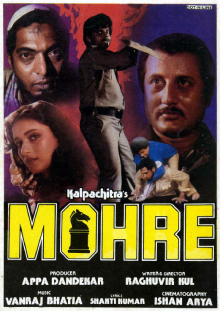
Mohre (transl. Pawns) is a 1987 Indian Hindi movie directed by Raghuveer Kul. It starred Nana Patekar, Madhuri Dixit in lead roles. The pair later worked together in Vinod Chopra's Parinda, his own directorial debut, Prahaar, and the N. Chandra-directed Wajood. This film also starred Sadashiv Amrapurkar, Anupam Kher among others.
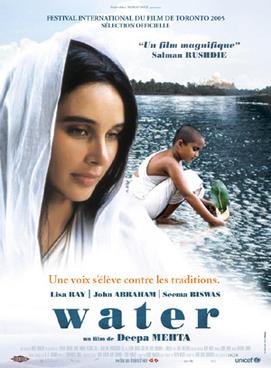
Water is a 2005 drama film written and directed by Deepa Mehta, with screenplay by Anurag Kashyap. It is set in 1938 and explores the lives of widows at an ashram in India. The film is also the third and final installment of Mehta's Elements trilogy. It was preceded by Fire (1996) and Earth (1998). Author Bapsi Sidhwa wrote the 2006 novel based upon the film, Water: A Novel, published by Milkweed Press. Sidhwa's earlier novel, Cracking India was the basis for Earth, the second film in the trilogy.
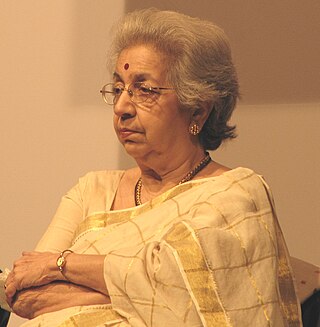
Vijaya Mehta, is a noted Indian Marathi film and theatre director and also an actor in many films from the Parallel Cinema. She is a founder member of Mumbai-based theatre group, Rangayan with playwright Vijay Tendulkar, and actors Arvind Deshpande and Shriram Lagoo. She is most known for her acclaimed role in film Party (1984) and for her directorial ventures, Rao Saheb (1986) and Pestonjee (1988). As the founder member of theatre group, Rangayan, she became a leading figure in the experimental Marathi theatre of the 1960s.
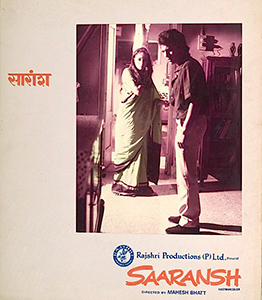
Saaransh is a 1984 Indian Hindi drama film directed by Mahesh Bhatt, starring Anupam Kher, Rohini Hattangadi, Madan Jain, Nilu Phule, Suhas Bhalekar and Soni Razdan. It is about an elderly Maharashtrian couple living in Mumbai who come to terms with the loss of their only son. This was the screen debut of Anupam Kher. The film had music by Ajit Verman and lyrics by Vasant Dev. It was produced and distributed by Rajshri Productions. It was chosen as India's official entry for the 1985 Academy Award for Best Foreign Language Film and was not nominated.
Jaywant Dalvi was a prominent contemporary Marathi writer in Maharashtra.
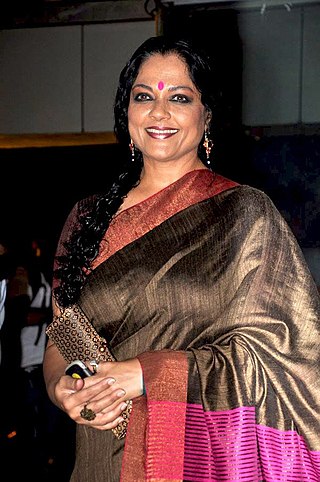
Tanvi Azmi is an Indian film and television actress. She is known for her roles in Akele Hum Akele Tum (1995), Bajirao Mastani (2015), Thappad (2020) and Tribhanga (2021).

Tamacha is a 1988 Hindi-language action film, produced by Prasan Kapoor under the Tirupati Pictures Enterprises banner and directed by Ramesh Ahuja. It stars Jeetendra, Rajinikanth, Amrita Singh, Bhanupriya in the pivotal roles and music was composed by Bappi Lahiri. Rajnikanth did an anti-hero role of an underworld don in this movie. The film was dubbed in Tamil as Ezhai Thozhan and also dubbed in Telugu as Praja Nayakudu.
The Elements trilogy of films by Indo-Canadian filmmaker Deepa Mehta deals with controversial issues of social reform on the Indian subcontinent. Fire, the first release in 1996, dealt with issues of arranged marriage and homosexuality in the patriarchal culture of India. Earth, released in 1998, dealt with the religious strife associated with the partition of India and the formation of Pakistan in the mid-20th century. Water, released in 2005, was the most critically successful of the three, and dealt with suicide, misogyny, and the mistreatment of widows in rural India.

Prasad Prabhakar Oak is an actor. He has received several awards including two Filmfare Awards Marathi and a National Film Award.

Pestonjee is a 1988 Indian Hindi-language drama film directed by Vijaya Mehta, starring Anupam Kher, Naseeruddin Shah and Shabana Azmi, based on a story by film journalist B. K. Karanjia.

Prem Ratan Dhan Payo is a 2015 Indian Hindi-language romantic family drama film written and directed by Sooraj Barjatya. Produced by Rajshri Productions, it stars Salman Khan and Sonam Kapoor. Neil Nitin Mukesh, Anupam Kher, Swara Bhaskar, Deepak Dobriyal and Aashika Bhatia play supporting roles. It is the fourth collaboration between Barjatya and Khan after their previous films Maine Pyar Kiya (1989), Hum Aapke Hain Koun..! (1994), and Hum Saath Saath Hain (1999), and it is the second collaboration between Khan and Kapoor after Saawariya (2007).
Indira Bai is an Indian novel in the Kannada language written by Gulavadi Venkata Rao (1844–1913). Published in 1899, it is considered the first modern novel in Kannada. It dealt with the hitherto ostracized practice of widow remarriage. A social novel set in present-day coastal Karnataka, and allegedly based on real incidents, it portrays a society in transition. Supporting widow remarriage, it denounces social evils like corruption in the bureaucracy and the reactionary attitude of established religious institutions and takes a critical view of contemporary society.
Coconut Motion Pictures is an Indian film production, distribution and marketing company established by Rashmin Majithia.
References
- ↑ "San Francisco International Film Festival '87". UC Berkeley Art Museum and Pacific Film Archive. 4 April 1987. Retrieved 22 June 2014.
- ↑ Eleanor Mannikka (2016). "Rao Saheb". Movies & TV Dept. The New York Times . Archived from the original on 5 March 2016. Retrieved 22 June 2014.
- ↑ "33rd National Film Awards". International Film Festival of India. pp. 28, 36. Archived from the original on 5 May 2014. Retrieved 22 June 2014.